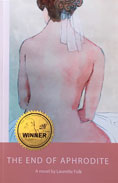
 |
In this poignant, riveting novel, readers encounter loss, grief, sustenance, and perseverance in the lives of multiple women facing seemingly impossible circumstances, including death, murder, and self-doubt. There are also discussions where creativity (and the isolation it involves) is key, as each woman's relationship with art, literature, and the creative process unfolds. Each woman's relationship with motherhood and life, intimacy, and death manifests in their individual stories. Due to all that she has endured and experienced, each woman transforms into a goddess in her own right. By the novel's end, the story arc has traveled across years and vast geographies with each woman, and their tales are shared in such an intimate manner that readers feel the women's stories are their own.
Most notable about this novel is its focus on the creative process, the freedom and wildness it offers, and the individual sacrifices one must make to nurture it. It also examines the relationship between the creator and the muse, particularly in its account of Etta and Patrick's relationship: "Patrick painted her with gold leaves in her hair, in a draped sheet. He painted her Vermeer style, as a handmaiden with a bowl of fruit. During her last days, he worked feverishly in his studio on a Madonna and child painting of Etta and the baby." The novel also explores the intimate relationship art holds with death, specifically through its portrayal of Elise, a young, rebellious, free-spirited poet destined to die: "She was awake, alive. She saw herself, juxtaposed with the dull-faced passengers, with their bodies bobbing and shifting to the train's rhythms. She would be nothing like these people."
In this book, creativity takes many forms, and readers only have to look to the character of Michaelis to see that. A Greek immigrant whose wife left him because she could not understand American society, Michaelis finds himself lost in a culture and a language that leaves him confused. After a devastating encounter with Elise, Michaelis turns to a life of redemption after the encouragement of his priest. He takes on the mission of bringing comfort to the dying, and by the end of the novel, readers see him visit Etta, using his talent of prayer and comfort to guide her into the afterlife. Narrators like Samantha remind readers of how a single person can bring innumerable lives together and change them in countless ways: "She is the goddess we've left behind. And yet it is she who rises when we feel the divine presence of love, and when we nurse our broken hearts and learn ultimately that these are less sorrows than they are threads, leading us from one place to the next."
Mythical yet modern, with unforgettable characters whose personalities will engross and challenge readers, this novel is a poetic, intellectual read. Its analysis and portrayal of human nature rank it up there with books like Olivia Kate Cerrone's The Hunger Saint. Its focus on the creative process and the Muses that carry artists onward make it a worthy read for anyone with a creative soul. Readers who enjoy psychological works like The Perks of Being a Wallflower that challenge the status quo on the definitions of family and relationships are sure to enjoy this novel. It is a book that slowly grips readers, and before they know it, they've finished it because the individual narratives are so gripping. Folk's book is truly one the reader will not want to put down.
Winner of the 2021 Eric Hoffer Book Award General Fiction Category
RECOMMENDED by the US Review